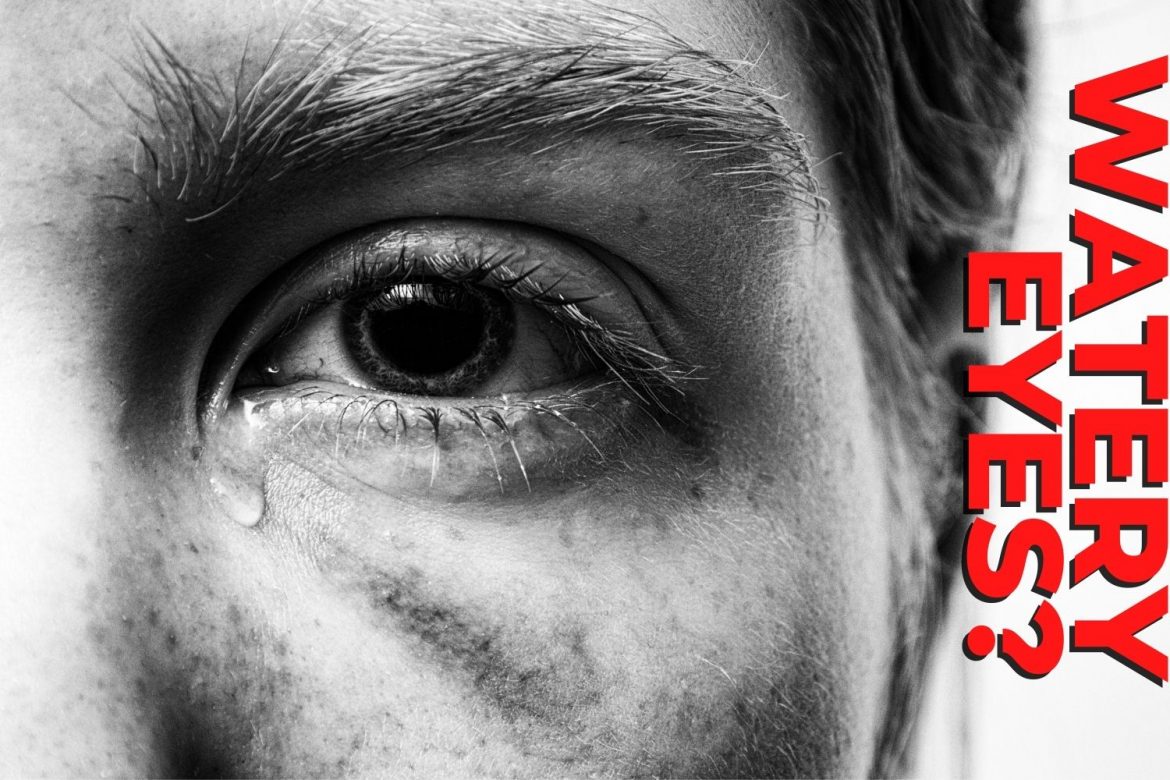![]()
Are your eyes streaming with tears when you aren’t even crying? Or maybe they just constantly feel wet.
Your eyes are designed to naturally produce tears to soothe and protect them. When you are around dust or smoke your eyes will temporarily produce additional tears as a defense mechanism to keep irritants out.
But what happens when your eyes produce excess tears for no obvious reason? Here are some possible causes for your watery eyes and tips for managing your symptoms.
The lowdown on tears
Tears are made up of water, oil, and mucous and are produced by the lacrimal gland which sits up under your upper eyelid. Tears drain into the ducts in the corner of your eye and down into your nose.
Tears are constantly produced and drained away to wash and clean the eye. This well-tuned system works like a tap and drain. The eyelids are the basin that holds the tears on the surface of your eye.
When you produce too many tears or your normal tear drainage system is blocked, your eyes water. Medically speaking, it’s referred to as epiphora.
What causes epiphora?
The causes for a watery eyes usually fall into two categories: (1) an overproduction of tears, or (2) a structural change in the eyelids or drainage system preventing normal tear drainage.
Overproduction of tears:
Allergies
If you experience red, itchy, watery eyes, the cause could be allergies. A change in your surroundings could trigger an allergic reaction.
- The most common outdoor causes of allergic eye symptoms are grass, tree, and weed pollens.
- The most common indoor causes are pet dander, dust mites, and molds.
Dry eye syndrome: As ironic as it may sound, if you suffer from dry eye, your eyes will often water. When the surface of your eye dries out it becomes irritated and uncomfortable. The lacrimal gland produces extra tears to compensate, overwhelming the eye’s natural drainage system.
Age, medications, and some medical conditions can lead to dry eyes. If you are undergoing chemotherapy, recently had LASIK eye surgery, or wear contact lenses, then you should seek advice from your eye doctor if you are experiencing symptoms of dry eye.
Infections
When you have an eye infection, your body often responds by producing excess tears to soothe the eye. The tears are also designed to wash away germs and discharge from your eye. Pink eye (conjunctivitis) commonly causes watering.
Abrasion
Dirt, sand, and contact lenses can all scratch the surface of your eye. When this occurs, your eye will reflex tear, becoming red and sensitive to light. Usually, minor scratches heal in a day or two.
Irritants
Your eyes produce excess tears in response to other types of irritation, such as dry air, bright light, wind, smoke, dust, an eyelash, or exposure to chemicals.
Inflammation of the eyelids
Known as blepharitis, it is caused by debris building-up on your eyelid margins, causing irritation and redness of the eyelid itself resulting in epiphora. Washing your eyelids daily with eyelid wipes will help with these symptoms.
Structural change:
Drainage system malfunction
When you have a blockage in a drainage duct the tears cannot adequately drain away. Medically, this is referred to as lacrimal stenosis and causes epiphora. Dacryocystorhinostomy (DCR) surgery is required to remove the blockage. In some cases, the opening to the drainage channel is narrowed rather than blocked, and a simple procedure called a punctoplasty can reinstate tear flow into your nose without requiring DCR surgery.
Poor eyelid function or position
For the tears to spread evenly over the surface of your eye, the eyelids need to close correctly. Ectropion refers to a condition where your lower eyelid is rolled out away from the eye surface (something that often happens with age). The pulling away of the lower eyelid from the surface of your eye will cause tears to spill over onto your cheek. Lower eyelid surgery is usually required to remedy this.
Trichiasis
Although this word is a mouthful, it actually refers to an ingrown eyelash. An eyelash can become misdirected and rub or scratch the surface of your eye leading to discomfort and watering. The eyelash can easily be removed by your eye doctor.
Most often, watery eyes are an annoying symptom rather than a cause for serious concern. Unless accompanied by eye pain or redness, excess tears are not usually a serious issue.
Diagnosing watery eyes and relevant treatment
You may be able to determine the cause of your watery eye.
- Do your eyes feel dry and uncomfortable just before they begin to water? You might be suffering from dry eye syndrome. The first line of treatment is lubricating eye drops, but if this does not give you relief see your eye doctor for more intensive treatment.
- Are your eyes and eyelids itchy, swollen and red? Allergies are the most likely cause. Remove the allergen and use anti-histamine eyedrops.
- Have you been around smoke, bright lights, smog or other air pollutants? Remove the irritant to relieve your symptoms.
If your symptoms persist or worsen, or you have eye pain or reduced vision ALWAYS seek advice from your eye doctor.
When should you take action?
Although some may consider watery eyes or epiphora a minor problem, it can affect your daily life. Extremely watery eyes can get irritating and troublesome and even interfere with your vision. Constant wiping of the eyes, eyelids, and cheeks results in redness and irritation.
The cause for your watery eye could be something that’s easily remedied. There’s no reason to simply put up with your symptoms. Be reassured watery eyes is not something you need to cry about. Seek advice from your eye doctor.

